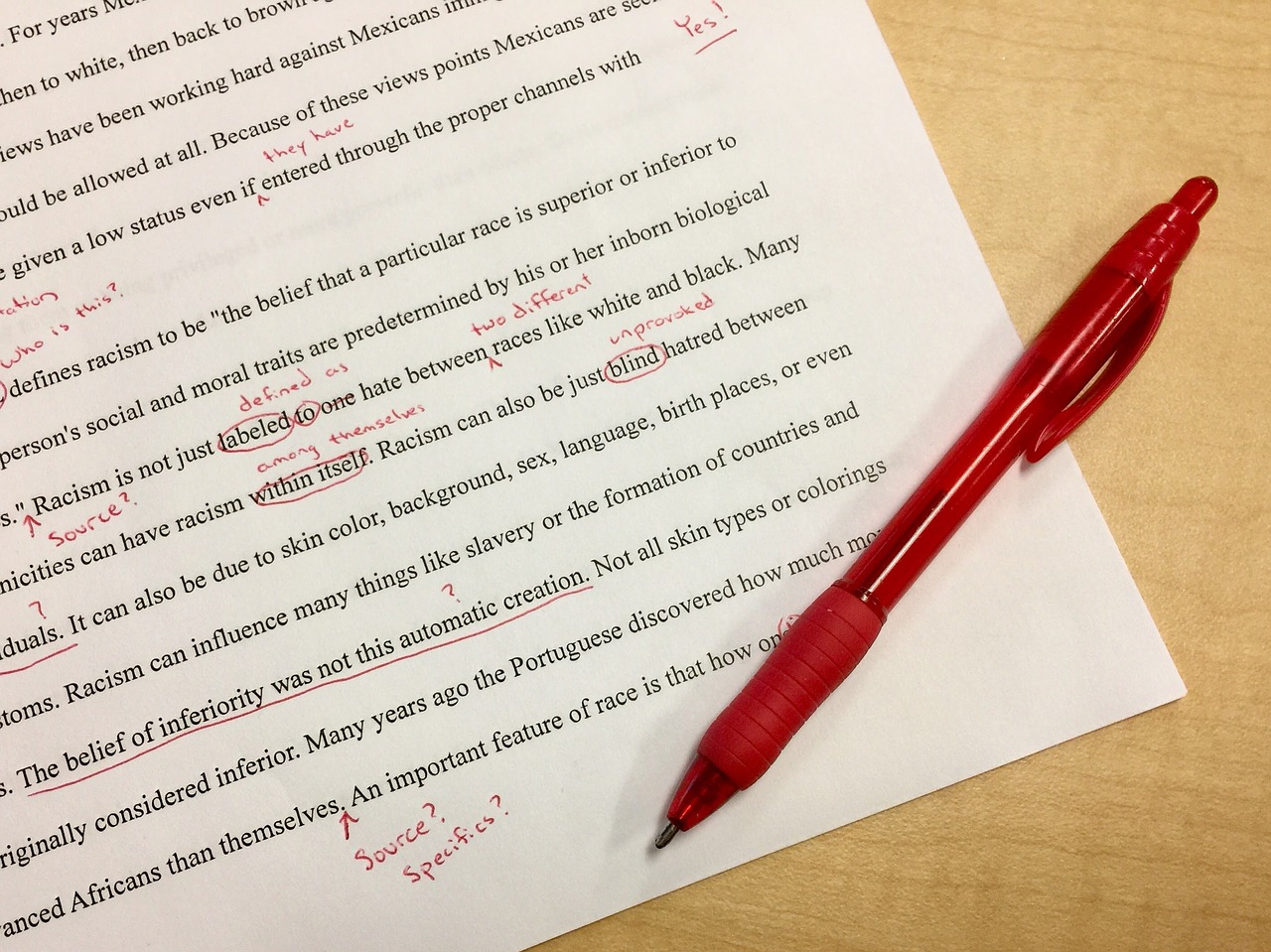
03 Sep The Worst Writing Mistakes You Can Make as a Copywriter
So, you want to become a copywriter? Maybe you already are one, but you still haven’t quite figured out the ins and outs of it? Well, no need to worry — we’ve all been there.
No matter how long you’ve been in the business or how hard you try, you are bound to make some writing mistakes. Still, there are some errors that we as copywriters tend to make more often than others.
If you want to learn about the worst copywriting mistakes and how to avoid them — keep on reading. First things first, though — let’s talk a bit about what copywriters do and how to become one.
What Do Copywriters Do?
If you type “What do copywriters do” into Google’s search bar, you’ll see that copywriters write copy. We can all agree that this definition is vague, at best. And, yes, copywriters do write copy; however, they also do so much more than that.
First, let’s give a quick explanation of what copy can be. As a copywriter, some of the things you’ll be writing are:
- Blog posts
- Video scripts
- Product reviews
- Case studies
- White papers.
These are just some examples, as you never really know what kind of a job might pop up tomorrow, and that’s sometimes half of the fun. In any case, keep in mind that writing is only part of the job.
Research
Before you even put pen to paper, or fingers to keyboard, you need to do your research. The best content writers usually spend most of their time on this step.
Not only do you need to research the topic you’re writing about, but you also have to find out more about your client and the target audience. For example, if you are writing for a company that sells crib mattresses, think about the potential customers.
Who are you selling the mattresses to? Well, your best guess would be to try and sell the product to new parents. So, research some of the questions and concerns parents might have about buying a crib mattress.Also, while you’re doing your research, make sure you’re citing credible sources. You can reference some interesting articles on why some mattresses are better than others, for example.
Once you’ve researched all of the information you need, start planning your copy. Think about how you’re going to introduce your readers to the topic. Always try to draw them in with the first sentence.
Then, consider how you want to present your arguments. It goes without saying, but you should always start with the most relevant points and end with the least important ones.
Edit
Try not to over-edit your copy while you’re still writing it. If you edit too much in the writing stage, you can easily lose your flow and stray off-topic. Instead, write everything you want, and once you’re done, start editing.
By doing so, you’ll be able to take a step back and read your copy from a fresh perspective. A good rule of thumb is to read everything aloud while you’re editing. When you read everything this way, it’s much easier to spot the writing mistakes and adjust the flow of the text.
Also, make sure to read your text a couple of times. Yes, reading something that has five thousand words is tedious and exhausting — but it’s also necessary. If you feel like the editing is stressing you out too much and you can’t focus — take a break.
You can go outside, breathe in some fresh air, or take a quick nap. Even if you’re on a tight deadline, a 30-minute break can help you recharge and refresh.
Becoming a Copywriter

The Internet will have you believe that just about anyone could become a copywriter who makes six figures. While that’s certainly possible, the reality is usually a bit different.
Even though you don’t need any formal education, you still have to master the language you’re writing in. Of course, the best content writers right now have been honing their craft for years, so don’t expect to get everything right at first.
Types of Copywriters
Before you start sending out resumés, you should figure out what kind of a copywriter you want to be. The three main categories are:
- Freelance copywriter
- Agency copywriter
- Corporate copywriter
Let’s quickly go through all of them so that you know what to expect before you start working.
Freelance Copywriter
As a freelance copywriter, it’s up to you to choose what you want to write about. Also, you’re in charge of your schedule and where you work from. However, before you commit to becoming a freelance copywriter, there are a few things you should consider.
First, you won’t have a steady workflow, and you’ll be in charge of finding work. Also, it could be difficult to find clients in the beginning if you don’t know anyone else in the industry.
Agency Copywriter
You might need a bit more experience if you want to land an agency copywriting job. Still, if you’re a younger writer, you can use social media to your advantage.
Nowadays, most companies are looking for content writers who can also manage their social media pages. So, if you have a good social media following, you can include that in your portfolio.
Corporate Copywriter
Working as a copywriter for a corporation means you’ll have a steady job and workflow. You’ll only be writing about the products or services your company sells.
Some of the things you’ll be writing are:
- Content for their website
- Brochures for their services or products
- Sample scripts
The Worst Writing Mistakes You Can Make
Now, let’s get into the reason we’re all here. What are the most common writing mistakes copywriters make, and why do they happen? Well, let’s find out together, shall we?
1. Drifting Off-Topic
One of the worst writing mistakes you can make while writing copy is drifting off-topic. When you’re writing copy, you need to be clear and to the point.
Remember, the client is paying you to write about a specific product or subject, and that’s what you need to deliver.
Of course, we’re not saying you should go overboard and repeat a few of the same sentences throughout the text. As a copywriter, you should be able to make your point without being repetitive. It’s a skill that you’ll have to learn if you want to become one of the best content writers in the business.
However, if you’re just starting out as a copywriter and want to avoid making this mistake, there are a couple of things you should know.
1.1. How to Avoid Drifting Off-Topic
First, making a plan before you start writing is crucial. By creating a plan or concept beforehand, you’re less likely to go off-topic. What’s more, you can even write down some ideas for titles or headings.
Another pro tip is to always think about who your target audience is. No matter what you’re writing about, try to imagine you’re explaining it to a friend who knows nothing about the subject.
2. Forgetting Your Target Audience
Honestly, not thinking about your audience is the stuff bad copywriting is made of. As soon as you forget who you’re talking to, your readers will lose all interest in your copy.
There are a couple of reasons content writers make this mistake.
2.1 They Want to Sound Smart
It goes without saying that good content writing requires you to have a handle on the language and an excellent vocabulary. But, even though you want to sound knowledgeable on the topic, you should never forget who you are talking to.
Also, if you want to ensure more people read your copy, don’t use overly complicated words. If someone is reading your copy to learn more about a product, they don’t want to spend half of their time looking up some big words in the dictionary.
2.2 They Don’t Understand the Subject Well
Another reason copywriters go off-topic is that they don’t have a good grasp of the subject matter.
As a copywriter, you’ll be asked to write about plenty of things you know absolutely nothing about. However, keep in mind that if you don’t really understand what you’re writing about, neither will your readers.
Your job is to explain everything about a product or a service in the easiest way possible so that almost anyone can understand. Your readers want to feel like you’re talking with them, not at them.
2.3 They Use the Wrong Writing Style
What does using the wrong style even mean? Depending on what kind of copy you’re writing, there are usually two main writing styles you can use:
- Formal
- Conversational
Some content writers don’t understand the difference between formal and educational, which causes them to often make writing mistakes. Just because your copy needs to be educational, it doesn’t mean you’re writing a dissertation.
Of course, if you’re writing for a medical or legal website, it shouldn’t sound too conversational. But, again, that doesn’t mean you should use big, complicated words just to seem smart.
2.4 How to Avoid Forgetting Your Target Audience
Always keep your target audience in mind and don’t forget that, at the end of the day, people have short attention spans. Try writing clear and concise sentences to avoid making this mistake.
Also, and this is key — do your research. The more you understand the product or service you’re selling, the easier it’ll be to figure out the right style.
If you’re still struggling with some of these writing mistakes, don’t worry. Nowadays, there’s an app for everything. You should take advantage of different online editors to help you get started.
3. Poor Formatting
When it comes to the worst writing mistakes a copywriter can make, there’s a good reason poor formatting is in the top three.
Have you ever tried to read an article online but were distracted by how badly it was formatted? Us too.
If you want to compete with the best content writers in the business, you need to know how to format your copy. We don’t just mean separating your paragraphs — you have to learn everything there is to know about formatting.
Again, as you already know, readers online tend to pay less attention, so writing a block of text can put them off reading your copy. No matter how good your text is, they’ll go to some other source if it isn’t readable.
3.1 How to Avoid Poor Formatting
First, learn how to separate your paragraphs and get familiar with the white space. A good rule of thumb is to have three or four shorter sentences per paragraph.
Also, learn about headings and subheadings. Good content writing requires you to use headings.
Of course, don’t go overboard and just put a subheading under every paragraph. Instead, plan your copy ahead and think about how you want to split it up.
What’s more, you should use different writing tools to make your copy more readable. For example, you can use bullet points to:
- Show readers how easy it is to read your text
- Provide a visual break from the rest of your text
- Make pros and cons lists
You can also highlight certain parts of your copy to draw more attention to them. But, remember, moderation is key. Don’t overdo it with the bullet points and highlight all over your text because that will actually make it less readable.
4. Keyword Stuffing
Another common mistake that content writers tend to make is overstuffing their copy with keywords.
Usually, clients will give you a keyword to include in your copy to optimize the content. However, if you overdo it with the keywords, the opposite will happen. Not only will you not optimize the copy, but the search engines will mark your text as spam.
All of the writing mistakes we’ve previously mentioned will put off the readers from reading your copy. But, this mistake could have the website blacklisted from all future online rankings.
4.1 How to Avoid Keyword Stuffing
While you should include the keyword as often as you can, the copy still needs to sound natural. Never try to overdo it and put the keyword in every sentence. Also, if you’re working with multiple keywords, try to sprinkle them all across your copy, not just in one place.
A good rule of thumb is to always put the main keyword in the first and last paragraph of your copy. Moreover, you should try to incorporate some keywords in your headings and subheadings to better optimize your copy.
Get familiar with long-tail keywords, too. They might not bring in as much traffic as short-tail keywords would, but you should still know when and how to use them.
Another thing to consider is that your main keyword density should be at least 0.5%. You can also use different tools to check how good your optimization is.
5. Bad Grammar and Spelling

Bad grammar is a bit lower on our list purely because good grammar is absolutely indispensable. Making a lot of grammar mistakes could end up costing the company you’re working for millions in lost sales.
And that’s just the tip of the iceberg. Research shows that companies whose content is riddled with grammar mistakes seem less trustworthy. So, by making common writing mistakes, you are losing your credibility.
But, all of this isn’t to say you won’t be making grammar and writing mistakes in the future. If even the best content writers in the business have a few slipups here and there, so can you.
However, if you want to be one of the best, you’ll have to pay more attention to what you’re writing.
5.1 How to Avoid Making Grammar Mistakes
The first step is to carefully read your text multiple times. No matter how long your copy is, whether it’s two or twenty-two pages long, you need to read every single word to ensure it’s grammatically correct.
Also, turn your spell checker on, but don’t rely on it too much. Spell-checking apps can be a real lifesaver sometimes, especially if you’re on a tight deadline. However, don’t think they’ll do all of the work for you.
Finally, and this bears repeating, read everything aloud once you’re done. By reading everything aloud, you can avoid missing some obvious writing mistakes.
6. Plagiarism
You wouldn’t think this even needs to be on the list, but you’d be surprised how often people try to pass off someone else’s work as their own. What’s more, some content writers don’t even put in the effort to find other sources and just rewrite an entire Wikipedia page.
The main reason your client hired you is that they wanted original content, written from a new and fresh perspective. So, by taking somebody else’s content, you’re going to lose credibility as a content writer.
Also, just like with keyword stuffing, if the search engines detect plagiarism in your work, they can remove you from their rankings. All in all, it’s just a bad idea, and no good can come out of plagiarizing someone’s work.
6.1 How to Avoid Plagiarizing Content
If you want to make sure you’re content is plagiarism-free, you need to do your own research. By doing your homework on the subject, you can ensure that what you’ve written is original.
Also, you can use different websites and tools to help you check for plagiarism in your copy. While it may seem like an unnecessary step, trust us — you’ll save yourself a lot of trouble by checking your content before you send it out.
7. Watering Down the Content
In an effort to draw in more readers, you might decide to water down your content. We get it — when you’re first starting out, you want to attract as many readers as you can, so you try to pander to them.
But, this can sometimes be counterproductive and is one of the most common writing mistakes you can make.
Customers are getting savvier, so they can figure out when somebody’s just saying what they want to hear. And just because you’re writing a product or service review, it doesn’t mean you should use every positive adjective in the dictionary.
What’s more, always try to avoid including common knowledge. For example, if you’re writing about a roofing contractor, you should avoid saying, “A roofing contractor can help you install a new roof.” These kinds of statements don’t go over well with customers, and they can make them click off your page much faster.
7.1 How to Avoid Watering Down the Content
First, be direct and to the point. If you’re trying to sell laundry detergent, don’t talk about how detergent is made for five pages. Instead, try to come up with new and creative ways to describe what it could do for the customer and why it’s a great choice for them.
Second, don’t stretch yourself too thin. We’ve all been there — sometimes you might not have enough references to write an article. In that case, try to find the most important argument in your copy and focus on it. It’s better to write one argument in an original and creative way than to write fifteen and just brush over all of them.
Finally, have fun with what you’re writing and try to build a relationship with your readers. Again, always remember that people love when you talk to them, not at them.
8. Not Considering Search Engine Optimization
The final, and possibly the easiest writing mistake to make, is not optimizing your content and making it SEO-friendly. For anyone just starting out as a copywriter, let’s give a quick explanation of what search engine optimization (SEO) is.
In short, when you’re writing copy, you have to make sure you’ve used the right keywords and links so that the website gets a better online ranking. Also, your copy needs to be unique and has to have a good meta description.
Optimizing your copy is not an easy thing to do, especially when you’re first starting out. But, there’s no need to worry; we’re about to show you how to ensure your website ranks well.
8.1 How to Optimize Your Copy
In essence, if you want to optimize your copy, you’ll have to avoid most of the writing mistakes we’ve talked about.
First, start with an enticing introduction and a good headline. Then, pay attention to your keywords and grammar. Don’t overdo it with the keywords because search engines will block your website.
What’s more, you have to pay attention to your formatting. If you want to optimize your copy, you need to make sure it has plenty of headings, subheadings, and paragraphs. Still, if you’re not sure how well you’ve optimized it, you can check it by using tools like Yoast.
With Yoast, you can check the readability, keyword optimization, and so much more. Yoast is really useful not only to copywriters who are just starting out but also to those who’ve been in the business for a long time.
Final Thoughts
There you have it — the worst writing mistakes you can make as a copywriter. Now that you know what some bad copywriting practices are, you can get ahead of the curve and avoid making them.
That being said, don’t put too much pressure on yourself. While you should always try your hardest to deliver great content, you’re bound to make some mistakes. But, that’s okay — we all do because we’re only human.





